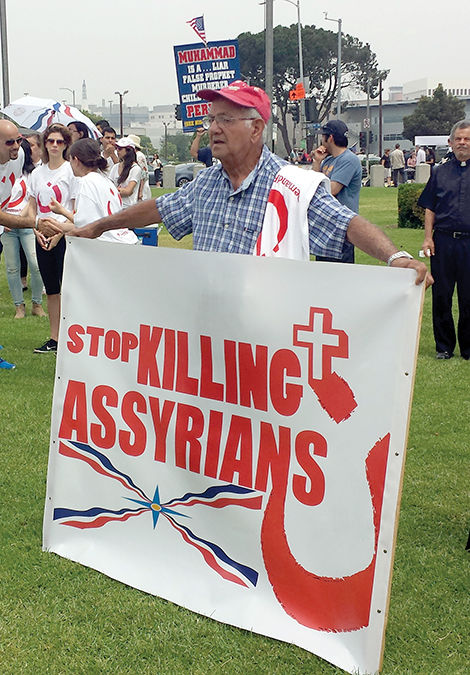More than 1,000 men, women and children of different faiths and ethnicities gathered on the lawn of the Federal Building in Westwood Aug. 2 in solidarity with local Assyrian Christians to peacefully — but with strong voices — protest the escalating violence against Christians in the Middle East.
“We are here today as a united people, Christians and non-Christians alike, to stand as one voice to denounce and condemn the despicable violence, terrorism and human rights abuse that is a daily occurrence against the Christians of the Middle East, especially those in Iraq and Syria,” said Father George Bet-Rasho, pastor of St. Mary Assyrian Church of the East in Tarzana.
“How many more of our mothers, fathers, sons and daughters do we have to bury before the world joins us?” he continued in a booming voice, eliciting loud cheers and applause from protesters. “We urge the State Department to develop a comprehensive U.S. policy on the survival of the Assyrians and other indigenous minorities in Iraq.”
The Saturday morning protest was one of 37 such demonstrations held that day in more than a dozen countries around the world — all under the common moniker “Demand for Action” — aimed at raising awareness of the persecution Christians and other non-Muslim groups are currently facing daily in Iraq and Syria, and to urge the United States and other Western countries to intervene on their behalf.
According to event organizer Melina Karamian, a St. Mary’s parishioner, since the June takeover of Mosul, Iraq’s second-largest city, by Sunni extremists of the Islamic State (IS) — previously known as the Islamic State of Iraq and Syria (ISIS) — IS has systematically assaulted the local Christian community, which had been indigenous to the region for more than 16 centuries.
To target Christians, IS militants began marking Christian homes in Mosul with the Arabic letter “nun,” which stands for Nazarene, an Arabic reference to Christians.
In July, IS distributed fliers to Mosul Christians that read: “Convert, Pay Jizya, Leave or Die” — demanding that Christians convert to Islam, pay a tax (that most families could not afford), leave Mosul by July 19 or face death. As a result, Christians fled in droves before the deadline, many with little to no possessions (most of which were confiscated by IS militants) to seek refuge in the nearest Christian villages (which are vulnerable to future IS attacks) or to Kurdistan.
Chorbishop Samuel Dinkha, pastor of St. Paul Assyrian Chaldean Catholic Church in North Hollywood, is a native of Iraq who came to the U.S. in 1979. He said his homeland is being “torn apart” by Islamic extremists who are carrying out a genocide war against Christians, sects of other religions, and other minorities.
“The situation is very bad and very unfortunate — Christians are dying every day with no one defending them, and we are afraid that someday it will happen here in our country, in the United States,” he told The Tidings during the Aug. 2ndprotest.
“That is why we are demanding, very peacefully, that the U.S. government help our people in any way they can,” he added, “whether it is providing safe havens to them there, in Iraq and Syria, or by facilitating some coming [as refugees] to the United States, to help reunite families who are being scattered everywhere.”
According to Chorbishop Dinkha, about 2 million Christians lived in Iraq at the start of the Gulf War in 1990, dwindling to 1 million before the U.S. invasion in 2003. Recent statistics indicate the current number to be less than 300,000.
Adrienne Shamoon, 18, attended the protest with 10 members of her parish youth group from St. Paul’s. She said she felt compelled to participate to help call attention to the violence that is plaguing Iraqi Christians.
“We are such a small group of people and our people are dying and [being pushed out of their homes],” she said. “They are destroying all of our artifacts and way of life. Being here today, it’s good to see other kids my age, and people who are older and younger, come together to support this, because we’re all one people.”

